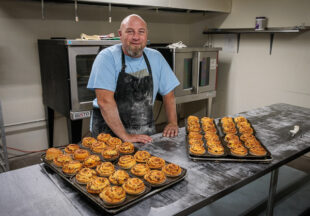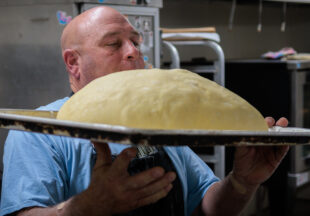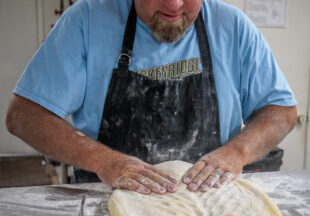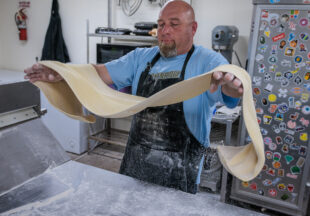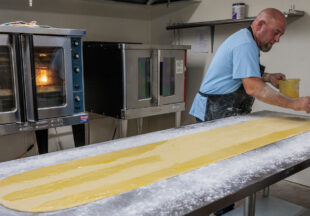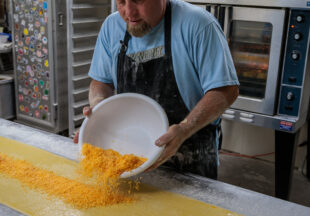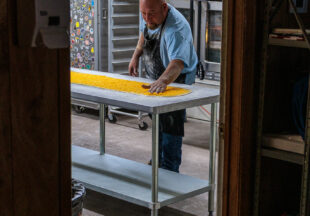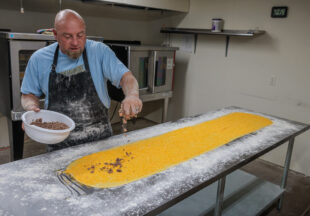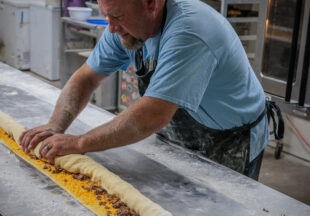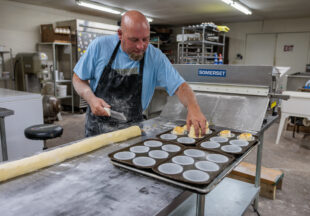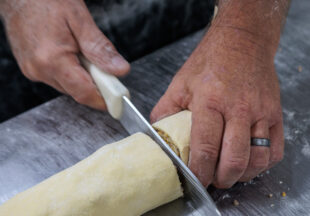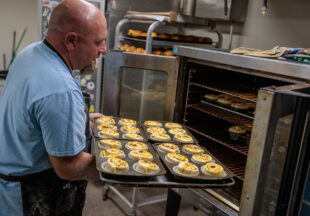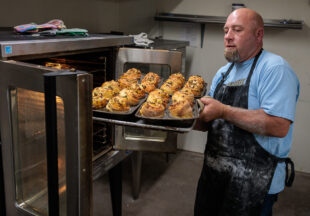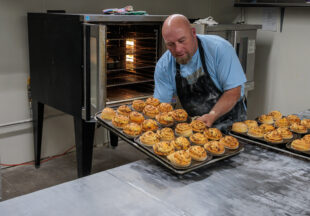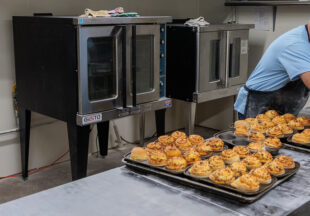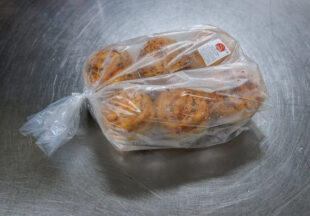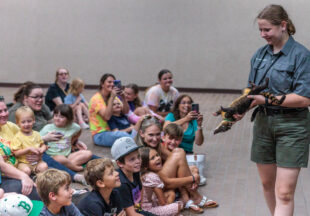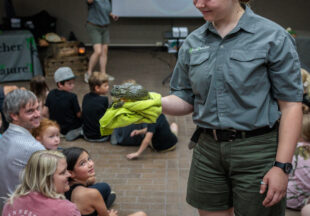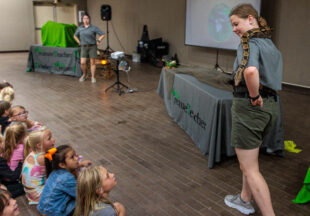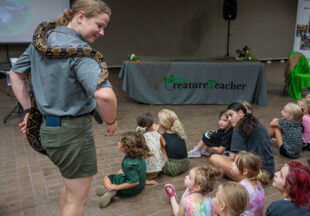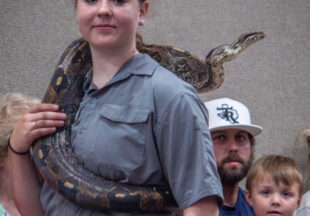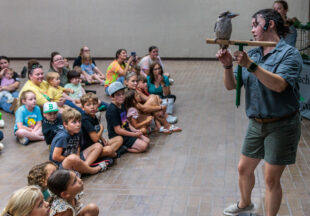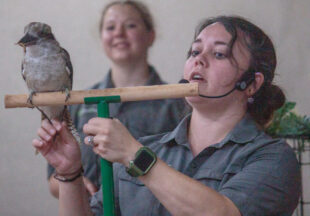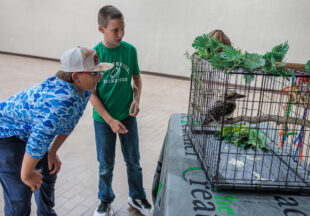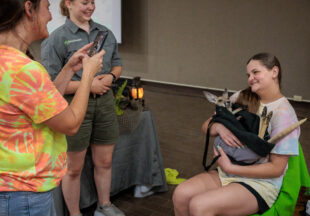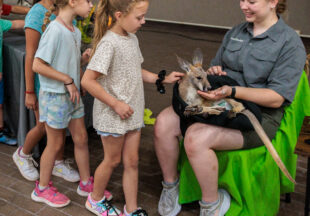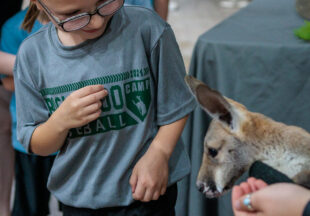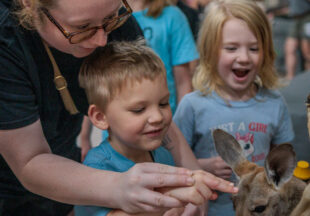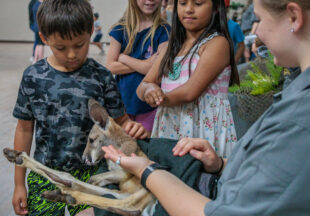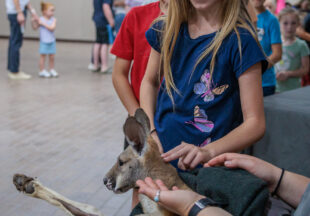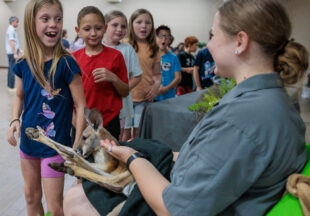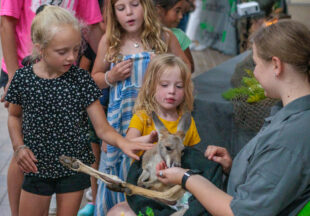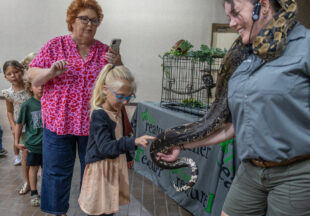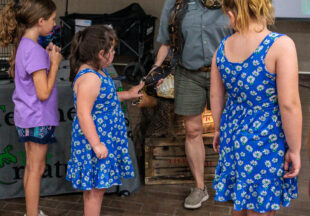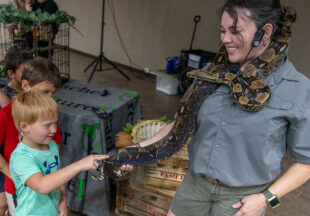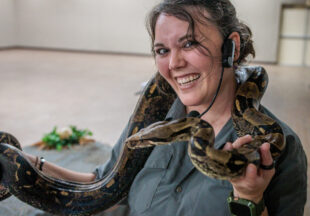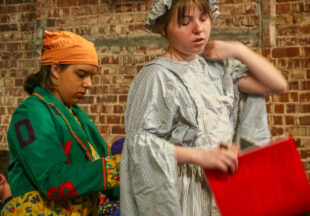When the going gets tough, the tough get growing: Local musicians farming hemp to survive pandemic

By Carla McKeown/Breckenridge Texan
As the worldwide coronavirus pandemic reached Texas earlier this year, the livelihoods of bands like the Urban Pioneers were put on hold indefinitely. But, in true pioneer spirit, Breckenridge native Liz Sloan McGovern and her husband, Jared McGovern, adapted to the new lifestyle and found another way to make a living: growing hemp.

Jared McGovern shows his latest crop of hemp, which is in the mid-growth stage, at Clear Fork Cultivation. (Photo by Tony Pilkington/Breckenridge Texan)
The couple make up two-thirds of the “hillbilly swing” band the Urban Pioneers, along with Martin Sargent. When the novel coronavirus and the disease it causes, COVID-19, began to spread, most bars in Texas were shut down and music festivals and other events that the band frequently played at were canceled.
Without their usual ways of earning a living, they started looking for other ways to support themselves and their daughter, Maybelle, who was born in May.
The McGoverns live on the McLemore Ranch, a cattle ranch which Liz’s great-grandfather purchased in 1931. Today, it is operated by her dad, Parks Sloan, along with his cousin Jim Everett. Located in the northeastern portion of Shackelford County, not far from the Stephens County line, the ranch’s rocky hills are dotted with mesquite and oak trees, and the Clear Fork of the Brazos River winds its way through one corner of the ranch.
Since the pandemic forced them to give up the touring life they had known since they met a decade ago, Liz and Jared have stayed on the ranch with Maybelle, leaving only to buy necessities and to play at a few outdoor events that weren’t canceled. Joining them as they wait for the COVID-19 threat to pass are fellow musicians/artists Lulu VanTuckett and Allen Wayne Nichols.
After reviewing their entrepreneurial options, Liz and Jared decided to join the Texas hemp industry, which is still in its earliest stages. This summer, they launched Clear Fork Cultivation, selling hemp oil and hemp rubbing balm, as well as several other products. Jared’s brother, Aaron McGovern, has also moved to the ranch to help with the hemp farm.
Legal Requirements
The transition from musicians to farmers wasn’t easy, and the process was further complicated by the legal requirements surrounding the growing of hemp in Texas.
With no more experience than a simple backyard garden, Jared started researching every aspect of the hemp farming business. The growing of hemp was only recently legalized in Texas, and those planning to grow the plant that is similar to, but different than, marijuana are required to obtain a license to grow hemp and sell the products.
They received their Hemp Producer License in April and planted the seeds about a week later.
“This is everything we’ve been doing for the past year, for the most part,” Jared said, looking around at the dozens of plants growing in their barn. “We started as soon as we could; I was one of the first people that applied for the license online. And then as soon as we got it, we put seeds in the ground and started growing.”
The Growing Process
Jared and Liz grew their first hemp crop outside in the rugged, hardscrabble land of north-central Texas. But, first the hot summer temperatures – and now the colder winter temperatures – convinced them to try growing the crop inside with grow lights. So far, that plan is working.
Because of the state’s schedule for issuing the licenses, their first crop was planted too late in the season to be overly successful outside. “We tried a run outside, and then everything stopped in August,” Jared said. “It was just so hot, everything just stunted. And it just stopped. And so we went ahead and we finished the crop and that was OK. We did about 150 plants outside just as a tester.”

Once the hemp plants have matured, they are moved to the drying room. (Photo by Tony Pilkington/Breckenridge Texan)
Although they have enough land to plant many more than the initial 150 plants, they wanted to start small in case something went wrong. “I heard about a lot of people planting 30 to 40 acres, and they lost everything,” he said. “I just I didn’t want to invest that and lose that. So we did 150 plants outside, and that went OK, but after going inside, it’s so much better.”
Jared said the plants grown inside were the same types of plants that they grew outside, but the indoor plants were much more successful. “I think it’s mostly because it’s just a brutal sun. Whenever they’re outside in June, July, they’re doing really good and they started taking off; everything was looking right,” he said. “But then once we got to late July and August, it was like 120 degrees every day, and I was watering every day.”
Jared and Liz created a grow room and a drying room inside their barn, but he said he’d like to build a greenhouse for year-round growing. A greenhouse will dissipate the sunlight and allow for more temperature control. “It’ll be like the best of both worlds between indoor and outdoor,” he said.
Aside from the sun, the biggest threat to the hemp crop so far has been caterpillars, which got inside the buds and ate them from the inside. But, Jared learned to spot the voracious bugs and get rid of them – and the moths that laid the eggs – as soon as possible.
To get the flowers needed to produce oil, the hemp plants need to be female plants, so the farmers buy seeds that are supposed to be all-female. Then, once the plants start growing, they keep an eye on the plants to make sure no male seeds were accidentally included in the batch.
With the indoor growing system, they have plants in three different stages: seedlings, mid-growth plants and cut plants that are drying. Once the plants have matured, they are defoliated and the flowers are left to dry. It is about a four-month cycle, two months in the vegetative stage and two months in the flowering stage with three to five days needed for drying, Jared said.
Then, the flowers are stripped from the stems and are shipped to a processor in the Austin area. There, the oil is extracted and the consumable products are created according to recipes decided on by Liz and Jared.
About Hemp
Hemp and marijuana are both cannabis plants, but hemp contains a very low amount of tetrahydrocannabinol (THC), the mind-altering component in marijuana. The State of Texas mandates that hemp contain no more than 0.3 percent THC.
Jared said the plants are tested to make sure the THC content is 0.3 percent or less. If the sample that’s tested shows a higher content, the entire crop has to be burned, he said.

Clear Fork Cultivation sells hemp oil and hemp rubbing balm. (Photo courtesy of Clear Fork Cultivation)
Hemp is grown for three main types of products: Oil, fiber and seeds. Different types of plants are cultivated for each specific use.
Hemp fibers are grown to be turned into a variety of products, including fabric, paper, building materials, rope, twine and more. The seeds are often turned into food for humans and animals.
The hemp oil that the McGoverns are producing is non-intoxicating and contains cannabidiol (CBD). It is often used to treat anxiety, pain, inflammation associated with acne, seizures, and other ailments. Although the oil is widely used, the U.S. Food and Drug Administration has not approved CBD oil for treatment of any medical condition.
The two types of CBD products that Clear Fork Cultivation sells are a rubbing balm, which is mixed with a variety of other oils, waxes and extracts, and hemp oil, which also includes CBG (cannabigerol), another non-intoxicating component of cannabis.
Reaction
Liz said their products have been selling well and people have been supportive of their new business.
“My dad’s completely supportive. That’s really what counts, you know, since this is his land,” she said. “So as long as he’s given me the OK, then I’m going to make a living somehow. And this is the only thing that makes sense to us right now.”
The McGoverns
Liz grew up in Breckenridge until she was 8 years old, and since then she’s lived here off and on through the years. She and Jared, who is from Tennessee, met about 10 years ago when they were both in the same band. After playing with another band for a while, they started the Urban Pioneers five years ago.
In the band, Liz plays the fiddle, which she first started playing in Breckenridge when she was 3 years old. Jared, a U.S. Navy veteran, plays the banjo and the guitar. The Urban Pioneers have performed in Breckenridge several times, including a 2018 concert at the National Theater.
They were married on the ranch in 2018, hosting a music festival for their wedding. Their daughter, Maybelle, was born earlier this year and was named in honor of Maybelle Carter, June Carter Cash’s mother.
Even after the pandemic is over and life returns to normal, Liz said she doubts they will return to the same life they led before, constantly touring with the Urban Pioneers. “We were touring anywhere from 250 to 300 days a year, and that’s just impossible now,” she said. “We have a different perspective on life, especially with (Maybelle). I mean, we’ve tried to do things like going to an outdoor festival with her. It was like a seven-hour drive, and it was not fun… for her or for us.”
They might try some shorter tours, like a week at a time, when Maybelle is older, she said.

The Urban Pioneers performed at the Sloan Everett Pure Country Pedal Memorial Bike Ride in October. It was one of the few performances they’ve had this year, due to the coronavirus pandemic. (Photo by Tony Pilkington/Breckenridge Texan)
Cutline, top photo: Since the coronavirus pandemic, as well as having a new baby, has curtailed their opportunities for touring with their band, the Urban Pioneers, Liz Sloan McGovern and Jared McGovern, pictured here with their daughter, Maybelle, have turned to hemp farming to make a living. Their company, Clear Fork Cultivation, sells two types of hemp products, hemp oil and hemp rubbing balm. (Photo by Tony Pilkington/Breckenridge Texan)
The Breckenridge Texan, which is a non-profit news organization, is in the midst of our annual fundraiser. We are participating in NewsMatch, a program that will double any donation (up to $5,000) you make through Dec. 31. Click here to visit the Breckenridge Texan’s NewsMatch page. We will greatly appreciate any support!






